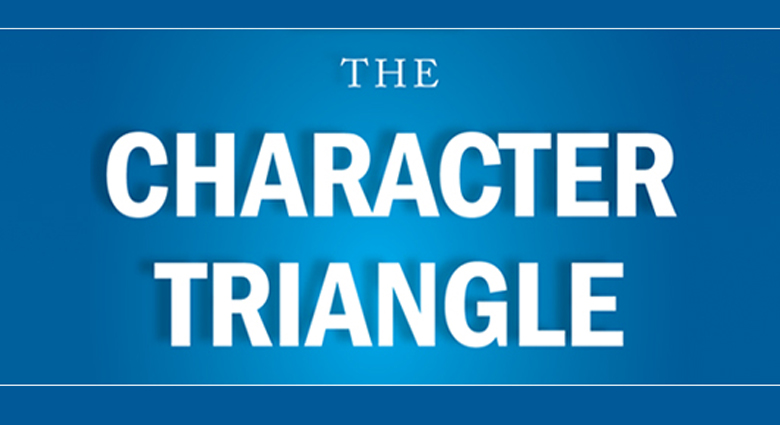Have you heard statements like this: Why don’t they do something about it? I wish I wouldn’t have to change? Why can’t things be better? Why do salespeople suck? Why does operations screw up all the time? I wish we had better tools. We need a bigger budget. Why do the other guys have a better territory? My boss is a jerk.
These comments likely indicate that one or more core values may require strengthening. While an organization requires a purpose that is inspiring, a business model that works, a great management system that drives value; at the heart of the entity is how people think and work together.
"Your successes or failures are built on the strength of your relationships."
My research and experience underscore the importance of three core values — Accountability, Respect and Abundance (the Character Triangle)—and their impact on the mind, hands and heart of the people who make the place run.
1. Accountability
This starts with self. When you approach every situation by first asking what you can do about it and how, you begin to understand self-accountability. The ideas associated with blame and victim have little place in the self-accountability framework. Do you often blame others for your condition and circumstances? When you see yourself as having the responsibility, power, and control to influence your personal remit, the impact is powerful. Instead of thinking that they are responsible for your state, you think, “How can I contribute to a more desired state?” Before asking anything of anybody, ask yourself, what can I do about it?
2. Respect
Your successes or failures are built on the strength of your relationships—and relationships run on respect. To be true to the root of respect, you need to look at yourself with openness and understanding.
Examine the way you treat yourself first and then how you treat others. Most of us want to be listened to with understanding, treated with courtesy, and recognized for our contributions. Do you do that with yourself—and with others—in every interaction?
When you give respect first, you believe: my teammate is a valuable colleague with insight and information that can propel me and the organization forward. In response, you’re given the same platform. Listening becomes imperative, and communication and problem solving skills are requisite. This listening and dialogue platform of respect is naturally then extended to customers and the partnership ecosystem. Acting from a foundation of respect becomes a way to think and act. Tough issues and problems are addressed in timely ways, since everything is seen as a process. And processes can be measured and improved to achieve better results. A strong culture of respect is based on attacking processes and not each other.
"Abundant people don’t have to take anything away from anyone else to succeed."
3. Abundance
Abundant people don’t have to take anything away from anyone else to succeed. It is fun to work with people who are abundance-focused. They may be competitive, but not just to beat someone, rather to advance something. Abundant people relish other’s success and achievements. They focus on the resources available and find what they need to get results. Generosity of spirit and the belief that giving leads to getting is their makeup. Abundant-thinking people focus on resources they have rather than what they lack. They try to expand the pie by finding more resources or better using what they have. They do not use a lack of resources as excuse for inaction or stasis. Some people are eaters (they see the pie as definitive and ultimately want more than you); some are bakers (they try to expand the pie so everyone has more). Abundance is about the value of personal growth and progression. Who has more or less, and petty jealousy, is not on the agenda. The focus of abundant people is on what’s possible.
These three values become exponentially more powerful when connected; hence The Character Triangle. When the elements play off each other, the way people think, act, and connect measurably shifts to a positive, action orientation.
Sustainable excellence emerges when the purpose, form, fitness, and function connect—when accountability, respect, and abundance drive the head, hands, and hearts of people.





.png)



What Did You Think?